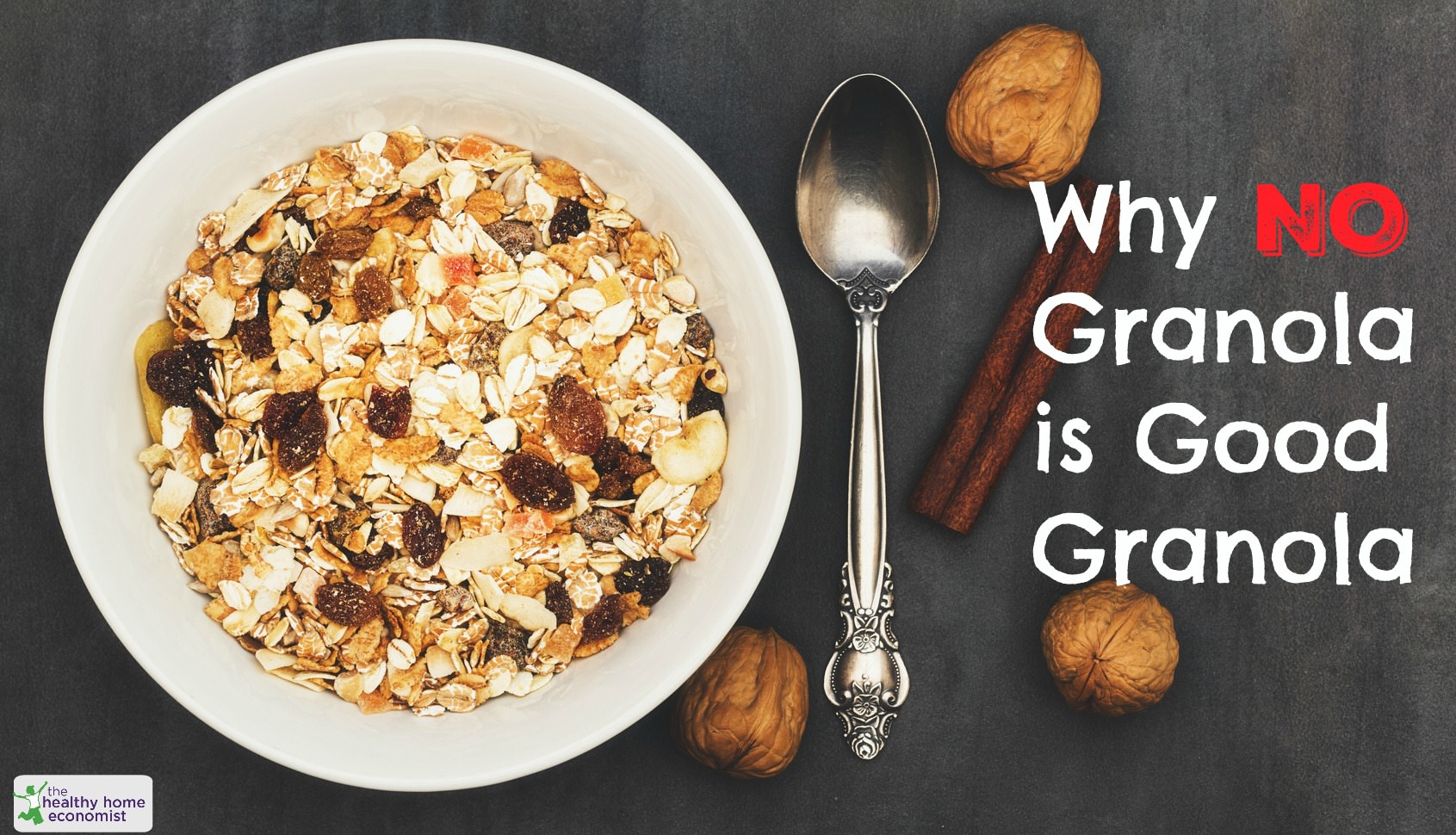Table of Contents[Hide][Show]
 Several readers have emailed me recently inquiring about how to best go about making homemade granola.
Several readers have emailed me recently inquiring about how to best go about making homemade granola.
One person carefully soaked oats for 24 hours in water with an acidic medium and then dehydrated before mixing with the other ingredients and toasting in the oven.
Another used sprouted, organic rolled oats and baked in a 200F oven with various other ingredients to make her favorite version of homemade granola.
While both of these approaches to making granola are certainly a huge improvement over any of the granolas to be had at the store, the fact is that even organic granola made with rolled oats that have been sprouted or soaked is not an easily digestible food.
The proteins in grains are extremely difficult to digest. They have the potential to cause health problems over the long term, which is why traditional societies took such great pains to soak, sprout, or sour leaven them before consuming.
Not only did traditional peoples soak, sprout, or sour leaven their grains, they also thoroughly cooked them as the final preparation step before eating.
Why Granola is SO Difficult to Digest
The dry heat of an oven at the proper toasting temperature is simply not hot enough to complete the breakdown of anti-nutrients in oats or other grains. Thus, even homemade granola is extremely difficult to digest. Eaten often, it can damage the gut over time.
Perhaps if a person has an iron gut, then homemade granola that is soaked or sprouted might work on occasion. The reality is that most people have sensitive guts anymore due to several generations of children raised on antibiotics and processed foods. Most people have some sort of digestive sensitivity to grains even if there are no grain allergy symptoms present.
I know for me, I bloat terribly if I eat homemade granola that has been soaked or sprouted and then toasted. I have no grain allergies and my digestion is in pretty decent shape. Interestingly, thoroughly cooked unsoaked oatmeal digests far better. The lesson at least to me is that the final cooking step is very important!
I have only made granola for my family once or twice. However, I stopped after observing the undigestibility of consuming this non-traditional food even when seemingly prepared in a traditional fashion.
Do your digestion a favor and opt out of any grain based granola entirely. Even homemade, organic, and soaked and/or sprouted versions aren’t good for your long term gut health.
Healthy Alternatives to Granola
Don’t hesitate to use soaked or sprouted grains that are fully cooked for all your other dishes and baked goods! This article plus video tutorial for a healthy cold breakfast cereal recipe is a very digestible alternative to granola.
Another alternative is to make grain free Paleo granola using the linked recipe.
Sarah, The Healthy Home Economist
Sources and More Information
Nourishing Traditions, p. 454
Soaked Oatmeal Benefits Without the Soaking?








How and why Grains may not be the best choice for us humans.
Maybe you’d like to try Quinoa instead with dinner?… http://t.co/i4lrMB50
I make nut granola with soaked and then dehydrated walnuts, pecans and almonds, maple syrup, soaked pumpkin seeds, raisens, cinammon and dried cranberries YUMMY!
I think you could find an article saying that everything we could possibly consume is unhealthy. I still believe it’s a great alternative to store bought cereal and done on occasion, I don’t quite see how it could harm you. When we travel, i make this and my kids think its a special treat. Most things, when done excessively and not in balance are rarely tolerated well.
To soak or not to soak, this is my question. I’ve all but given up on this. I AM sensitive to gluten, but I’m constantly finding contrasting articles from bloggers I respect. I also respect their resources. Soaking is easier to digest. Soaking increases the gluten, avoid grain to help prevent cancer, blah, blah , blah. I wish I had cold hard facts on this particular food item.
Observe how you tolerate it when you eat it. Observation never lies …. I know soaking works as I see how I bloat and feel uncomfortable when I eat grains that aren’t soaked. There are always caveats to be aware of kind of like soaking beans where some types you use baking soda and others where you use cider vinegar (with filtered water).
Don’t get frustrated. Just keep learning and adjusting your approach as you go. Nothing remains static .. we are always learning and moving forward.
is the healthyhomeeconomist going paleo?
@ Lorri – granola is called muesli here.
Here you go. http://girlgoneprimal.blogspot.com/2010/02/recipe-grain-free-granola-nola-final.html Note that ALL seeds and nuts should be soaked overnight. That’s not covered in this recipe.
I understand about the less absorption, etc… But I kinda’ figure if homemade granola is the worst we do (for occasional snacks and breakfasts) then we are doing pretty well.
I understand about the less absorption, etc… But I kinda’ figure if homemade granola is the worst we do (for occasional snacks and breakfasts) then we are doing pretty well.
Wondering about the Pickl-It recipe/process mentioned above. Because of the technology of the jar, the granola can ferment without getting any mold or so it allows for a long ferment period. Would this be sufficient, possibly?
I’ve had the opportunity to taste this Pickl-it recipe, though not enough to know if it would cause issues for me. The person who made it doubled the spices, which was good. It is not a sweet granola.
Try it and see Zusa. If your digestion is in tip top shape, you can perhaps handle it occasionally. I wouldn’t make it a daily thing though.